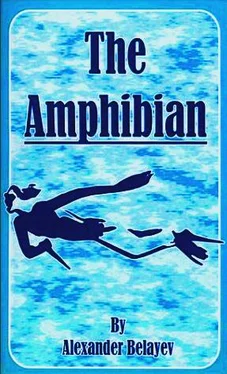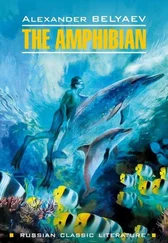“What nonsense! God indeed! Father says God is old wives’ tales! “ Ichthyander said hotly. “Surely you could have talked her out of it?”
“Unfortunately it’s an old wives’ tale that Gutierrez believes. The missionaries made a devout Catholic of her; I tried my best to show it up for what it was and couldn’t. She even said she’d never see me again if I went on abusing God and the Holy Catholic Church in her presence. So I had to ease down. And at the hacienda I had no time to go deeper into it anyway. Just enough to exchange a few words. But, there’s something else she told me. When the wedding was over, Zurita said with a guffaw, ‘Well, one thing’s taken care of. The little bird’s caught and locked up, now’s the turn for the little fish.’ He then explained to Gutierrez, and she to me, what little fish he meant. He said he was going to Buenos Aires to catch the ‘sea-devil’, and make Gutierrez a millionaire’s wife. You are not that ‘sea-devil’ by any chance, are you? You stay underwater for hours, you scare pearl-divers…”
Caution prevented Ichthyander from letting Olsen into his secret. Not that he could have explained it anyway. So leaving Olsen’s question unanswered he himself asked:
“What does he want him for?”
“Pedro intends to make the ‘sea-devil’ pearl-dive for him. If you are that ‘sea-devil’, take care! “
“Thanks for the warning,” said the amphibian.
Now Ichthyander had not the slightest idea that on and off he had been headline news in Buenos Aires.
“I can’t…” Ichthyander said passionately. “I must see her. Even if it’s the last time. The town of Parana you said? Yes, I know it. It’s up the River Parana. But how do I find the Hacienda Dolores?”
Olsen explained.
Ichthyander gave Olsen’s hand a firm shake.
“I must apologize. I came to see an enemy and found a friend. Good-bye. I’m off to see Gutierrez.”
“Straightaway?” Olsen was smiling.
“Yes, not losing a minute,” Ichthyander replied, jumping overboard and swimming shorewards. Olsen only shook his head.
Ichthyander’s preparations for the joitfney did not take long. He collected his town suit and shoes, strapped them to his body with the leather belt he carried his knife on, put on his goggles and gloves and set out.
In the Rio de la Plata numerous anchored craft lay in Ms path, pigmy steam tugs darting in and out. From below the tugs looked like so many water-bugs scuttling here and there. Round him a thin-trunked submarine forest of anchor chains and buoy-ropes stained up to the oil-filmed surface from a floor that was copiously littered with heaps of spilt coal and dumped slag, lengths of worn hose, pieces of sail, discarded tins, bricks, broken bottles, and — closer inshore — dead dogs and cats.
The sun was still up, but down here a grey-brown twilight reigned unchallenged. The River Parana discharged its waters into the gulf, heavily laden with sediment.
Ichthyander could easily have lost his way in the thicket of chains and ropes but for the guiding current of the inflowing river. It’s amazing how untidy people are, he thought, running a fastidious eye over the sea-floor, which looked like one huge rubbish-dump. As he swam towards the head of the gulf, just under the ships’ keels, breathing became gradually harder, as for a man in a sealed-up room.
On his way he saw a few corpses. One of them, which he passed quite close, had a smashed head and a length of rope weighted with a stone round the neck. Somebody’s crime was buried here. Ichthyander put on speed, wishing to leave the gruesome sight well behind.
But the higher up the gulf he penetrated the stronger was the oncoming current. There were currents in the ocean too, but he knew how to put them to use, much as the sailor puts to use a fair wind. Here there was only one current, and that was in the wrong direction. It couldn’t hold back an excellent swimmer like Ichthyander but it slowed down his progress enough to irritate him.
Suddenly something heavy hurtled down past him, almost brushing his side. A ship’s anchor had beed dropped. Oho, thought Ichthyander, this seems a dangerous place to swim in, and he looked round him. A big steamer was coming up from behind.
Ichthyander went lower and when the ship’s hull was passing above him he clutched at her keel. Colonies of barnacles had formed a rough layer on the steel plates, just allowing him to get a grip. Suspended from the ship’s keel in a way not exactly comfortable, he was at least out of danger, and being carried upstream at a reasonable speed.
The ship was now going up the river itself. Ichthyander breathed heavily in the water thick with silt. His arms were getting quite numb but he was loth to part with the ship. What a pity I couldn’t take Leading along, he thought, remembering the dolphin. He had been obliged to discard his original plan: Leading could not have made the whole trip underwater, while Ichthyander would have been afraid to surface in heavily navigated river.
Ichthyander was finding it increasingly hard to keep his hold, his arms were so numb. Besides he suffered pangs of hunger; he had had nothing to eat for hours. Deciding he should make a break he released his grip and sank onto the river-bed.
In the deepening twilight Ichthyander examined the silty bottom. But he could find neither flounder nor oyster shells. What fish darted about near him were of fresh-water species that he did not know. After several unsuccessful attempts to catch one he decided they were much more cunning than their sea-water kin. Only when night descended and the fish went to sleep did Ichthyander manage to catch a big pike. Its flesh was tough and tasted of silt but the famished amphibian ate with relish, swallowing it bones and all.
Then he thought he would rest a bit. The one advantage of being in a river was that he could at least snatch a few hours of quiet sleep, with no thought of prying sharks or octopuses. He only had to make sure the current did not drag him downstream in his sleep. Ichthyander piled up a few big stones into a rough groyne and settled down in the lee of it, his arm anchored round one of the stones.
However his sleep was short. He felt the approach of a vessel, opened his eyes and saw the signal lights. The vessel was coming upstream. The amphibian quickly went up and prepared to cling on. But this time it was a motor boat with a bottom as smooth as glass, so after a few attempts which nearly carried him against the screw, Ichthyander gave up.
And it wasn’t until a few boats had gone downstream that he at last managed to cling fast to a steamship going upriver.
In this way Ichthyander reached the town of Parana. The first lap of his journey was over. But the most difficult part of it-over land-was still ahead. Early the next morning Ichthyander swam away from the noisy harbour, found a stretch of river-bank with no sign of life in sight and scrambled ashore. He buried his goggles and gloves on the beach, then dried his suit in the sun and put it on. The crumpled suit made Mm look like a tramp. But that didn’t bother him.
Setting out along the right bank, as told by Olsen, Ichthyander kept asking the fishermen he met the way to the Hacienda Dolores owned by Perdo Zurita.
The fishermen eyed him suspiciously and shook their heads.
Hour after hour went by, the heat mounted but he was as uncertain of his way as when he had set out in the morning. On land Ichthyander had no way of finding his bearings in unknown surroundings. Besides his head swam with the heat and he was finding it more and more difficult to concentrate.
From time to time he took a dip in the river to refresh himself.
Читать дальше










